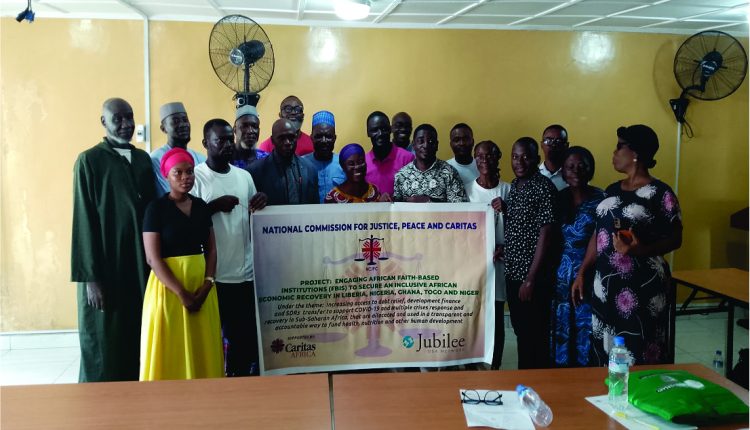By Laurina B. Lormia
(Cub-Reporter)
The National Commission of Justice, Peace Caritas (NCJPC) has ended an awareness titled “Engaging African Faith-Based Institutions (FBIs) to secure an inclusive economic recovery.”
The day-long awareness campaign held at the Cathedral Catholic Church on Broad Street, to inform the civil society on debt management unit on March 1, 2024.
The NPJPC informed the society about the debts portfolio, both domestic and external, on how the government of Liberia can take loans to invest and develop their country.
They informed citizens about the billions of dollars Liberia owes, and how to also campaign as church and citizens to advocate on behalf of the Government of Liberia.
The National Director for NCJPC, Rev. Fr. McDonald, said that, for over 25 years, the Catholic Church decided that, instead of always criticizing government or talking about bad policies, it is also important for the church to understand the things that are happening and why sometimes, the economy is bad.
“It is not just to say the government is not improving, but to also understand as a church so that we can communicate with our people to know exactly some of the things that are going on. People come at the churches complaining that they don’t have school fees to pay, the rate is too high, and things are so expensive, and we cannot just sit there and say let’s keep praying, but instead, we have to link with reality and understand why things have changed,” Fr. McDonald narrated.
He added, “In 2000, the church joined other people and we campaigned to see how the world will forgive the money that we owed, as we were owing so much money, and all our debts were swept away, because of the church and other faith groups.”
“We want our government to respond to the needs of our people, the money government will pay for the loan, instead of paying it back, they will just use that money to subsidize the rice; that was the reason the church campaigned at the time. Next year, 2025, will be 25 years since the last campaign of the church that is why we have the jubilee here, so we are getting ready again because we owe a lot of money for roads and school fees; we are part of the government,” he said.
“The last time you heard that we were owing again, but as we are about to go to campaign, we have to understand the realities, like why we are owing. Majority of the roads that government fixed, they are still owing for them, but the citizens are always there spoiling the roads and blaming government. Just two weeks ago, this government took 5.7 million to service the debt that they owed; that is about 14 percent of the 41 million.”
He stated, “The church cannot see all by itself, that is why in Liberia, we have gathered inter-religious councils and all of us together, not only the Catholic, can engage government and our people to explain to them what the legal issues are. We will sit with government to ask what they want us to do so that together, all of us can make our country better.”
According to Atty. Frederick Krah, Director of Ministry of Finance and Development Planning (MFDP), he said that the debt management unit to the Ministry should be responsible for designing in between public debt management policies and practices. According to the 1984 Constitution of Liberia, Article 34D, no loans shall be raised for the government or on behalf of the Republic or guarantees given from any public institutions or authority, other than the Bar or under the authority of the Legislature.
“Our December public debt portfolio stands at 2.2 billion dollars, and might slightly go up, because the debt management unit is currently doing reconciliation and validation for the entire 2023, for which domestic debt accounts for 938 million.”
However, “On the extender, our stock is 1.3 billion; the World Bank, the African Development Bank, and multilateral institutions that government borrowed from, the amount is 1.1 billion. Our debt stock, and from bilateral our stock is 115 million, multilateral 1.193 million, Alia, which is the funds basket on the World Bank, we have 249 million, the Arab Bank for Development, 31 million,” Krah said.
He added, “International Farmer Agriculture Development, we have 36 billion, ECOWAS Bank for Investment and Development, 20 billion, African Desert Bank, we have 8 million under the multilateral institutions; these are the monies we are owing them. Under the bilateral, we have the Government of China, 4.9 million; the Government of Kuwait, 20 billion, and Afrism SM Bank, 49 million.”
He concluded, “in 2018, our debts were 1 billion; in December 2023, 1.3 billion. If the government goes to borrow money, in most of the loans, the entire amount is not credited, so the money the previous government borrowed might likely be diverse in this new government.”

